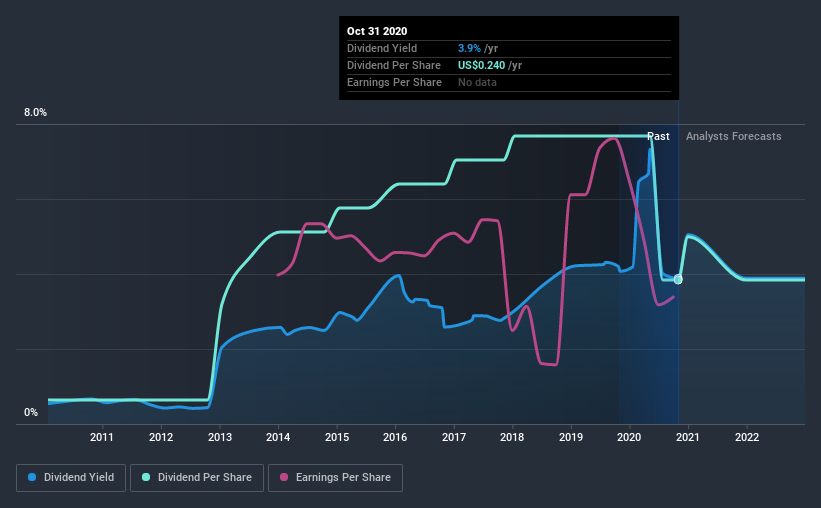Dividend Investors: Don't Be Too Quick To Buy Boston Private Financial Holdings, Inc. (NASDAQ:BPFH) For Its Upcoming Dividend

Regular readers will know that we love our dividends at Simply Wall St, which is why it's exciting to see Boston Private Financial Holdings, Inc. (NASDAQ:BPFH) is about to trade ex-dividend in the next 4 days. Ex-dividend means that investors that purchase the stock on or after the 5th of November will not receive this dividend, which will be paid on the 20th of November.
Boston Private Financial Holdings's next dividend payment will be US$0.06 per share. Last year, in total, the company distributed US$0.24 to shareholders. Based on the last year's worth of payments, Boston Private Financial Holdings stock has a trailing yield of around 3.9% on the current share price of $6.18. Dividends are a major contributor to investment returns for long term holders, but only if the dividend continues to be paid. So we need to investigate whether Boston Private Financial Holdings can afford its dividend, and if the dividend could grow.
View our latest analysis for Boston Private Financial Holdings
If a company pays out more in dividends than it earned, then the dividend might become unsustainable - hardly an ideal situation. It paid out 83% of its earnings as dividends last year, which is not unreasonable, but limits reinvestment in the business and leaves the dividend vulnerable to a business downturn. We'd be concerned if earnings began to decline.
Generally speaking, the lower a company's payout ratios, the more resilient its dividend usually is.
Click here to see the company's payout ratio, plus analyst estimates of its future dividends.
Have Earnings And Dividends Been Growing?
Businesses with shrinking earnings are tricky from a dividend perspective. If earnings decline and the company is forced to cut its dividend, investors could watch the value of their investment go up in smoke. With that in mind, we're discomforted by Boston Private Financial Holdings's 7.3% per annum decline in earnings in the past five years. Ultimately, when earnings per share decline, the size of the pie from which dividends can be paid, shrinks.
Another key way to measure a company's dividend prospects is by measuring its historical rate of dividend growth. Boston Private Financial Holdings has delivered 20% dividend growth per year on average over the past 10 years. That's intriguing, but the combination of growing dividends despite declining earnings can typically only be achieved by paying out a larger percentage of profits. Boston Private Financial Holdings is already paying out 83% of its profits, and with shrinking earnings we think it's unlikely that this dividend will grow quickly in the future.
The Bottom Line
Should investors buy Boston Private Financial Holdings for the upcoming dividend? We're not overly enthused to see Boston Private Financial Holdings's earnings in retreat at the same time as the company is paying out more than half of its earnings as dividends to shareholders. This is not an overtly appealing combination of characteristics, and we're just not that interested in this company's dividend.
Having said that, if you're looking at this stock without much concern for the dividend, you should still be familiar of the risks involved with Boston Private Financial Holdings. For example, we've found 2 warning signs for Boston Private Financial Holdings that we recommend you consider before investing in the business.
We wouldn't recommend just buying the first dividend stock you see, though. Here's a list of interesting dividend stocks with a greater than 2% yield and an upcoming dividend.
This article by Simply Wall St is general in nature. It does not constitute a recommendation to buy or sell any stock, and does not take account of your objectives, or your financial situation. We aim to bring you long-term focused analysis driven by fundamental data. Note that our analysis may not factor in the latest price-sensitive company announcements or qualitative material. Simply Wall St has no position in any stocks mentioned.
Have feedback on this article? Concerned about the content? Get in touch with us directly. Alternatively, email editorial-team@simplywallst.com.

 Yahoo Finance
Yahoo Finance 
